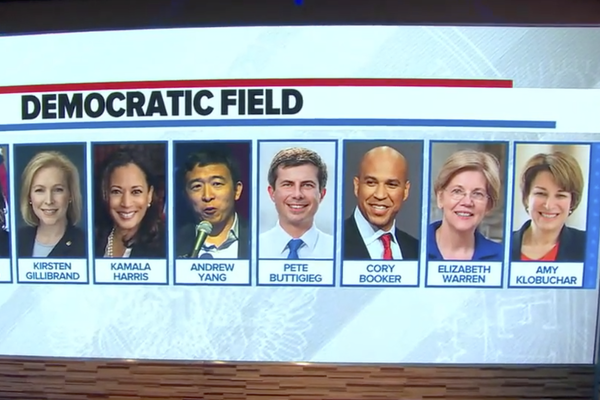From 37 to 79: Age and Presidential Campaigns

A portion of the Democrats running for president.
Age is rarely an issue in presidential elections. Most candidates are neither too young nor too old. The average age of the last ten presidents upon taking office was 57.
The 2020 election, however, bristles with age issues: Five candidates will be in their 70s on Election Day, four will be in their 40s and three will be in their 30s.
Donald Trump, at 70, was the oldest candidate to ever win the presidency. If re-elected, he’d leave office at 78, the oldest president ever to serve––beating Ronald Reagan by nearly eight months.
But Trump, now 72, is one of those people who isn’t measured by age. He even calls himself a “young, vibrant man.” While that may be something of a fudge, polls do show that Trump is perceived as strong and bold, traits rarely associated with geezers.
Among other septuagenarians running are three Democrats and a Republican. When the new president is elected, Bernie Sanders will be 79, Joe Biden will be 77, Elizabeth Warren will be 71 and Trump’s GOP challenger, William Weld, will be 75.
The political trap for older candidates is not age, in a narrow sense, but more widely, the appearance of generational disconnect. Are they in touch with the modern world? Do they understand the needs of younger generations? Little wonder that 50-year old Bill Clinton’s re-election slogan against 73-year-old Bob Dole was “A Bridge to the 21st Century.”
Seventy-two-year-old John McCain lost to 47-year-old Barack Obama in 2008 not so much because of his age, but because the country wanted change, and Obama’s youth perfectly embodied a “Hope and Change” message.
When candidates are young, on the other hand, the issue becomes experience and maturity of judgment. Have they seen enough of the world to master national leadership?
Theodore Roosevelt was the youngest U.S. president. At 42, he moved up from the vice presidency when President William McKinley was assassinated. John F. Kennedy was the youngest to be elected, at 43. In one of history’s touching parallels, he replaced the nation’s oldest president at that time, Dwight Eisenhower, who was 70 when he left office.
Kennedy’s entire career symbolized generational renewal, particularly apt in the years after World War II when young veterans were climbing increasingly steep career ladders. Kennedy won his first race for Congress at 29, and campaigned on the slogan ”A New Generation Offers a Leader.” In his inaugural address, he emphasized that “the torch has been passed to a new generation of Americans.”
Besides JFK and TR, America has had five other presidents in their 40s. The first three––Ulysses Grant, James Garfield and Grover Cleveland––were elected within a 16-year period, 1868-1884. The two most recent––Bill Clinton and Barack Obama––also won within 16 years, 1992-2008.
On the Democratic roster this year, five candidates are in their 40s and three are in their 30s. Former U.S. Rep. Beto O’Rourke will be 48 by Election Day. U.S. Rep. Tim Ryan and former mayor and HUD secretary Julian Castro will be 46, entrepreneur Andrew Yang will be 45 and U.S. Rep. Seth Moulton will be 42. U.S. Reps. Tulsi Gabbard and Eric Swalwell will be 39. The youngest candidate, Mayor Pete Buttigieg, will be 38––although he’ll become 39 the day before the next president takes the oath.
To offer perspective: When Buttigieg was born, Biden had already served nine years in the U.S. Senate. When Sanders was born, Franklin Roosevelt was president.
America has never elected a president in his 30s, although Williams Jennings Bryan won the Democratic presidential nomination at the tender age of 36.
The world has seen old leaders full of wisdom––Winston Churchill was 80 when he retired as British Prime Minister––and young ones brimming with new ideas. Emmanuel Macron was elected President of France at 39.
Mark Twain once said, “Age is an issue of mind over matter. If you don’t mind, it doesn’t matter.” As this campaign plays out, we’ll see about that.